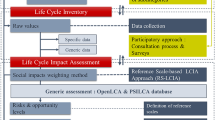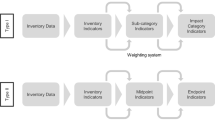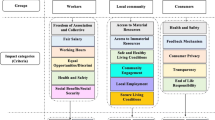Abstract
Purpose
This paper seeks ways to address positive social impacts in social life cycle assessment (SLCA) and attempts to answer two questions: How can the SLCA methodology be improved in order to systematically identify all potential positive impacts in the supply chain? How can positive impacts be taken into consideration along with negative impacts in SLCA? In order for SLCA to be an attractive tool, it needs to provide users with the possibility to include positive impacts, not as variables stipulating lack of negative impacts but rather as fulfilment of positive potentials.
Methods
By scrutinising the social impacts addressed in the SLCA UNEP/SETAC Guidelines today and reviewing approaches for positive impacts in other research fields, a developed approach to capture and aggregate positive social impacts in SLCA is proposed. To exemplify the application, the case of vehicle fuels is used to investigate the possibilities of addressing positive impacts in SLCA. This includes a literature review on potential positive social impacts linked to vehicle fuels.
Results and discussion
The subcategories in the SLCA Guidelines are proposed to be divided into positive and negative impacts and complemented with some additional positive impacts. Related indicators are proposed. A draft approach for assessing positive impacts is developed where the proposed indicators are categorised in four different levels, from low to very high potential positive impact. The possibility to aggregate positive social impacts is discussed. Besides multi-criteria decision analysis (MCDA), few useful ideas for aggregating positive impacts in SLCA were found in the literature that mostly focused on surveys and monetarisation. Positive social impacts linked to vehicle fuels (fossil fuels and biofuels) are identified, and the proposed approach is schematically applied to vehicle fuels.
Conclusions
The SLCA methodology may be refined in order to better identify and assess positive impacts, and approaches developed for capturing and aggregating such impacts are proposed. Challenges of aggregating positive and negative social impacts still remain. The knowledge on social impacts from vehicle fuels could be improved by applying the proposed approach. However, the approach needs more development to be practically applicable.
Similar content being viewed by others
References
Adeola FO (2000) Cross-National Environmental Injustice and Human Rights Issues. Rev Evid Dev World ABS 43:686–706
Amigun B, Musango JK, Stafford W (2011) Biofuels and sustainability in Africa. Renew Sust Energy Rev 15:1360–1372
Benoit C, Mazijn B (2009) Guidelines for social life cycle assessment of products: a social and socio-economic LCA code of practice. United Nations Environment Programme (UNEP), Paris
Benoit-Norris C, Cavan DA, Norris G (2012) Identifying social impacts in product supply chains: overview and application of the social hotspot database. Sustainability 4:1946–1965
Biemer J, Dixon W, Blackburn N (2013) Our environmental handprint: the good we do, 2013 I.E. Conference on Technologies for Sustainability. IEEE, Portland, pp 146–153
Buytaert V, Muys B, Devriendt N, Pelkmans L, Kretzschmar J, Samson R (2011) Towards integrated sustainability assessment for energetic use of biomass: a state of the art evaluation of assessment tools. Renew Sust Energy Rev 15:3918–3933
Cassman KG, Liska AJ (2007) Food and fuel for all: realistic or foolish? Biofuels Bioprod Biorefin 1:18–23
Cheong S-M (2011) A social assessment of the Hebei-spirit oil spill. GeoJournal 76:539–549
Chevron (2014) 2014 Corporate Responsibility Report. Chevron in Nigeria. http://www.chevron.com/countries/nigeria/default.aspx
Ciroth A, Franze J (2011) LCA of an ecolabeled notebook. Green Delta and Federal Public Planning Service Sustainable Development, Berlin
Coelho ST, Goldemberg J, Lucon O, Guardabassi P (2006) Brazilian sugarcane ethanol: lessons learned. Energy Sust Dev 10:26–39
Daw T, Brown K, Rosendo S, Pomeroy R (2011) Applying the ecosystem services concept to poverty alleviation: the need to disaggregate human well-being. Environ Conserv 38:370–379
De Vita G, Lagoke O, Adesola S (2015) Nigerian oil and gas industry local content development: A stakeholder analysis Public Policy Admin:0952076715581635
Dodgson J, Spackman M, Pearman A, Phillips L (2009) Multi-criteria analysis: a manual. Department for Communities and Local Government, London
Dong YH, Ng ST (2015) A social life cycle assessment model for building construction in Hong Kong. Int J Life Cycle Assess 20:1166–1180
Ekener-Petersen E, Finnveden G (2013) Potential hotspots identified by social LCA-part 1: a case study of a laptop computer. Int J Life Cycle Assess 18:127–143
Ekener-Petersen E, Höglund J, Finnveden G (2014) Screening potential social impacts of fossil fuels and biofuels for vehicles. Energy Policy 73:416–426
Esteves AM, Franks D, Vanclay F (2012) Social impact assessment: the state of the art. Impact Assess Proj Appraisal 30:34–42
EU (2009) European Parliament and Council, Directive 2009/28/EC of the European Parliament and of the council of 23 April 2009 on the promotion of the use of energy from renewable sources and amending and subsequently repealing Directives 2001/77/EC and 2003/30/EC, 2009
Feifel S, Walk W, Wursthorn S (2010) LCA, how are you doing today? A snapshot from the 5th German LCA workshop. Int J Life Cycle Assess 15:139–142
Gasparatos A, Stromberg P, Takeuchi K (2011) Biofuels, ecosystem services and human wellbeing: putting biofuels in the ecosystem services narrative. Agric Ecosyst Environ 142:111–128
Halldórsson A, Kovács G, Hall J, Matos S (2010) Incorporating impoverished communities in sustainable supply chains. Int J Phys Distrib Logist Manag 40:124–147
Hunkeler D (2006) Societal LCA methodology and case study. Int J Life Cycle Assess 11:371–382
ILO (2015) Conventions and Recommendations. International Labour Organisation (ILO). http://www.ilo.org/global/standards/introduction-to-international-labour-standards/conventions-and-recommendations/lang--en/index.htm. Accessed 28 January 2016
ISO (2000) Environmental labels and declarations – General principles - ISO 14020:2000. International Organization for Standardization (ISO), Geneva
Jeswani HK, Azapagic A, Schepelmann P, Ritthoff M (2010) Options for broadening and deepening the LCA approaches. J Clean Prod 18:120–127
Jørgensen A, Le Bocq A, Nazarkina L, Hauschild M (2008) Methodologies for social life cycle assessment. Int J Life Cycle Assess 13:96–103
Jørgensen A, Finkbeiner M, Jørgensen MS, Hauschild MZ (2010) Defining the baseline in social life cycle assessment. Int J Life Cycle Assess 15:376–384
Kim W, Jun HM, Walker M, Drane D (2015) Evaluating the perceived social impacts of hosting large-scale sport tourism events: scale development and validation. Tourism Manage 48:21–32
Lagarde V, Macombe C (2013) Designing the social life cycle of products from the systematic competitive model. Int J Life Cycle Assess 18:172–184
Lindberg K, Johnson RL (1997) The economic values of tourism’s social impacts. Ann Tour Res 24:90–116
Lindberg K, Andersson TD, Dellaert BG (2001) Tourism development: assessing social gains and losses. Ann Tour Res 28:1010–1030
Macombe C, Leskinen P, Feschet P, Antikainen R (2013) Social life cycle assessment of biodiesel production at three levels: a literature review and development needs. J Clean Prod 52:205–216
Max-Neef M (1992) Development and human needs. In: Ekins P, Max-Neef M (eds) Real-Life Economics: understanding wealth creation. Routledge, London, pp 197–213
Mouffe C (2005) On the political. Routledge, London
Ndzibah E, Ketola T, Ketola T, Salmi T (2010) Sustainability life cycle comparison of biofuels: sewage the saviour? MEQ 21:796–811
Norris GA (2013) The new requirement for social leadership: healing. an introduction to handprints and handprinting. In: Groschl S (ed) Uncertainty, diversity and the common good: changing norms and new leadership paradigms. Gower Publishing, London
OECD (2008) Biofuel support policies: an economic assessment. Organization for Economic Co- Operation and Development, Paris
O'Rourke D, Connolly S (2003) Just oil? The distribution of environmental and social impacts of oil production and consumption. Annu Rev Environ Resour 28:587–617
Parcell JL, Westhoff P (2006) Economic effects of biofuel production on states and rural communities. J Agr Appl Econ 38:377
Petti L, Ugaya C, Di Cesare S (2014) Systematic review of Social-Life Cycle Assessment (S-LCA) case studies. In: Macombe C, Loeillet D (eds) Social LCA in progress. Pre-Proceedings of the 4th International Seminar in Social LCA, Montpellier
Ramirez PKS, Petti L, Haberland NT, Ugaya CML (2014) Subcategory assessment method for social life cycle assessment. Part 1: methodological framework. Int J Life Cycle Assess 19:1515–1523
Rees W, Wackernagel M (1996) Urban ecological footprints: why cities cannot be sustainable—and why they are a key to sustainability. Environ Impact Assess Review 16:223–248
Ribeiro BE (2013) Beyond commonplace biofuels: social aspects of ethanol. Energ Policy 57:355–362
Rogers DS, Duraiappah AK, Antons DC, Munoz P, Bai X, Fragkias M, Gutscher H (2012) A vision for human well-being: transition to social sustainability. Curr Opin Environ Sustain 4:61–73
Schreckenberg K et al (2010) Social assessment of conservation initiatives. A review of rapid methodologies. International Institute for Environment and Development (IIED), London
Smeets E, Junginger M, Faaij A, Walter A, Dolzan P, Turkenburg W (2008) The sustainability of Brazilian ethanol—an assessment of the possibilities of certified production. Biomass Bioenerg 32:781–813
Traverso M, Asdrubali F, Francia A, Finkbeiner M (2012) Towards life cycle sustainability assessment: an implementation to photovoltaic modules. Int J Life Cycle Assess 17:1068–1079
van der Hilst F, van Eijck J, Verstegen J, Diogo V, Batidzirai B, Faaij A (2013) Impacts of scale up of biofuel production, Case Studies: Mozambique, Argentina and Ukraine. Copernicus Institute of Sustainable Development, Utrecht University, UNIDO, Utrecht and Vienna
van Eijck J, Romijn H, Balkema A, Faaij A (2014) Global experience with jatropha cultivation for bioenergy: an assessment of socio-economic and environmental aspects. Renew Sust Energ Rev 32:869–889
Vanclay F (2003) International principles for social impact assessment. Impact Assess Proj Appraisal 21:5–12
Vinyes E, Oliver-Solà J, Ugaya C, Rieradevall J, Gasol CM (2013) Application of LCSA to used cooking oil waste management. Int J Life Cycle Assess 18:445–455
Wilhelm M, Hutchins M, Mars C, Benoit-Norris C (2015) An overview of social impacts and their corresponding improvement implications: a mobile phone case study. J Clean Prod 102:302–315
Zhou P, Ang B, Poh K (2006) Decision analysis in energy and environmental modeling: an update. Energy 31:2604–2622
Acknowledgments
This publication is the result of a project within the Renewable Fuels and Systems Programme (Samverkansprogrammet Förnybara drivmedel och system), funded by the Swedish Energy Agency and the Swedish Knowledge Centre for Renewable Transportation Fuels (f3). The f3 Centre contributes, through knowledge based on science, to the development of environmentally, economically and socially sustainable and renewable transportation fuels, as part of a future sustainable society (see www.f3centre.se/samverkansprogram). The authors would also like to acknowledge the valuable inputs and comments from the two anonymous reviewers.
Author information
Authors and Affiliations
Corresponding author
Additional information
Responsible editor: Catherine Macombe
Rights and permissions
About this article
Cite this article
Ekener, E., Hansson, J. & Gustavsson, M. Addressing positive impacts in social LCA—discussing current and new approaches exemplified by the case of vehicle fuels. Int J Life Cycle Assess 23, 556–568 (2018). https://doi.org/10.1007/s11367-016-1058-0
Received:
Accepted:
Published:
Issue Date:
DOI: https://doi.org/10.1007/s11367-016-1058-0




